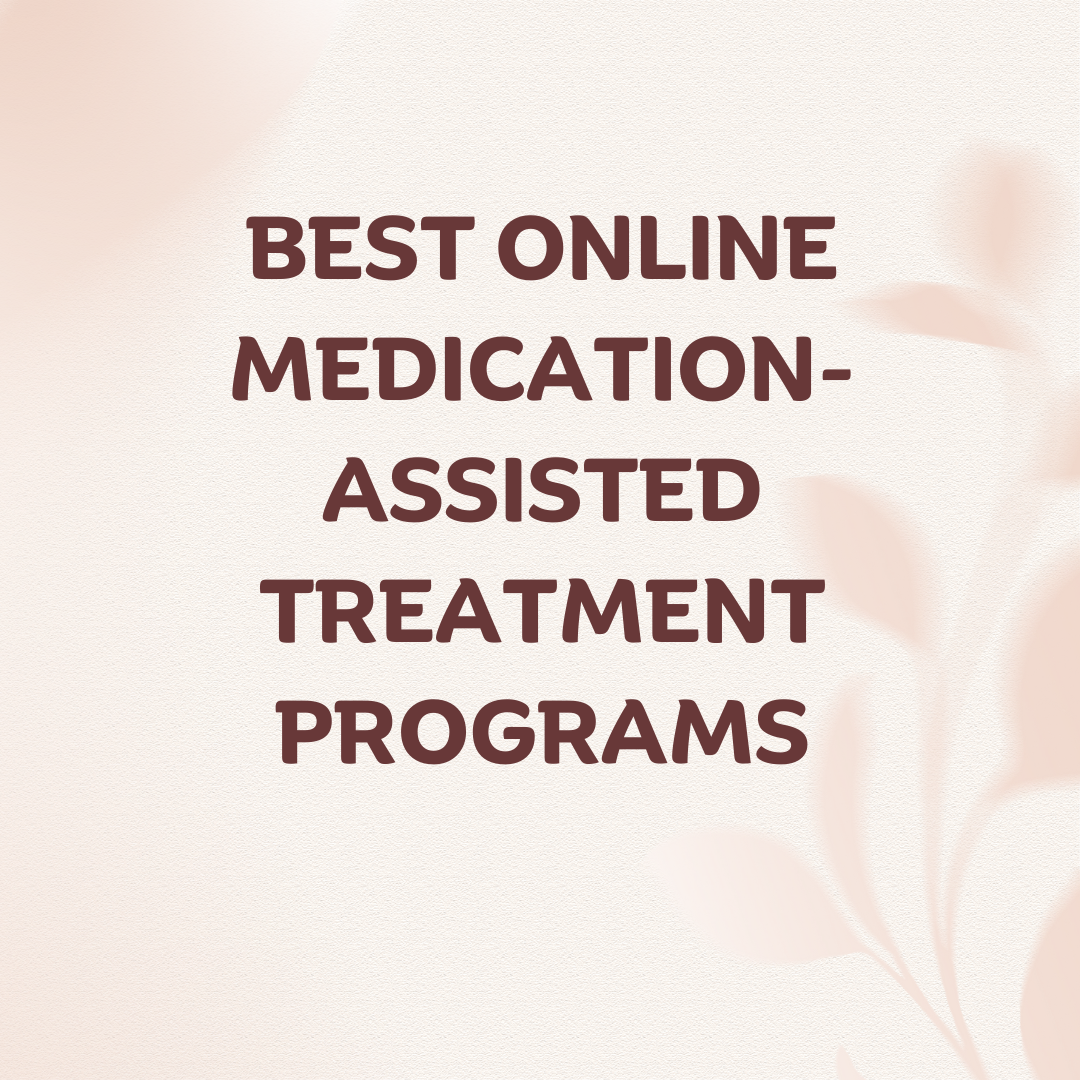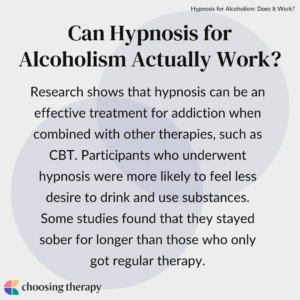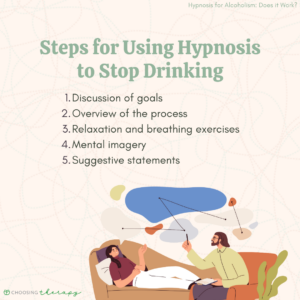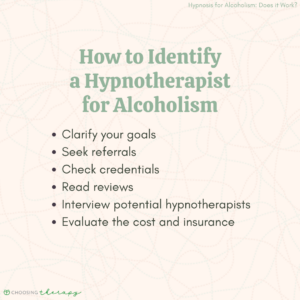Evidence suggests that hypnosis for alcoholism may help clients stop drinking when employed in a clinical setting. Hypnosis can be a powerful tool for self-improvement and personal growth, and trained clinicians may use techniques to access the subconscious mind to explore memories, traumas, and past experiences. Seeking hypnotherapy can allow patients to better understand and overcome their emotional issues tied to their drinking habits.
Ria Health: Effective, Evidence-Based Alcohol Treatment 100% Online Quickly change your relationship to alcohol with our at-home program. On average, Ria Health members reduce their BAC levels by 50% in 3 months in the program. Services are covered by many major health plans. Visit Ria Health
How Does Hypnosis Work?
Hypnosis directly influences the conscious and subconscious minds by leveraging the power of suggestion. A hypnotic state is a relaxed and focused state of clarity, allowing someone to bypass the superficial mind and access deeper levels of being. After clients achieve this mindset, hypnotherapists make suggestions to create positive changes in the client’s thoughts, feelings, and behaviors.
The types of hypnosis include:
- Authoritative hypnosis: Clinicians typically utilize a confident and authoritative tone, which helps the client feel relaxed and open to suggestions. Clinicians are clear, direct, and straight to the point, sometimes using scripts throughout sessions. For example, a client suffering from alcoholism may be told, “You will no longer crave alcohol.”
- Permissive hypnosis: Permissive hypnosis encourages clients to explore their minds by guiding them into a relaxed and meditative state. Clinicians use visual storytelling, metaphors, and open-ended questions to prompt clients into exploring their inner thoughts and feelings without judgment.
- Self-hypnosis: Self-hypnosis refers to inducing a hypnotic trance one oneself without the help of a professional. Individuals may use guided meditation or progressive muscle relaxation techniques. However, working with a trained clinician who can guide you in self-hypnosis is recommended, as it may not be for everyone.
What Conditions Can Hypnosis Treat?
Hypnosis can only be achieved when you are receptive to the process and fully committed to your transformation. While a therapist may facilitate hypnosis, your willingness to be hypnotized is critical to its success. Hypnosis may effectively treat several concerns for patients invested in a positive outcome from their hypnotherapy sessions.
The wide range of conditions hypnosis can treat include:
- Anxiety
- Pain management
- Confidence
- Weight loss
- Performance enhancement
- Improving learning and memory
- Phobias
- Boosting creativity and motivation
- Exploring past traumas
- Addiction
Does Hypnosis for Alcoholism Work?
Hypnosis for alcoholism (now known as alcohol use disorder) can be effective when combined with other therapies, such as cognitive-behavioral therapy and motivational interviewing. A recent study suggests some individuals can experience better outcomes after one year of a combined approach than those who only receive therapy for their drinking.1
However, hypnosis may not work for everyone suffering from alcohol use disorder. Hypnosis will not magically erase the desire to drink but will shed light on thinking and behaviors contributing to excessive drinking. Further factors can impact effectiveness, including the client’s support system, the therapeutic alliance, and external conditions causing triggers and cravings. Think of it as a recipe–you can’t make a cake with only sugar.
Help for Alcohol Use Ria Health: Effective, Evidence-Based Alcohol Treatment 100% Online Quickly change your relationship to alcohol with our at-home program. On average, Ria Health members reduce their BAC levels by 50% in 3 months in the program. Services are covered by many major health plans. Visit Ria Health Recovery.com – Find the best local detox or rehab center covered by your insurance. Search our unbiased and thorough list of the best mental health and addiction treatment centers. Read reviews. Start Your Search Want to drink less? Sunnyside helps you ease into mindful drinking at your own pace. Think lifestyle change, not a fad diet. Develop new daily routines, so you maintain your new habits for life. Take a 3 Minute Quiz
What to Expect From Hypnosis for Alcoholism
One of the most crucial factors in hypnosis for alcoholism is choosing a practitioner. Only work with qualified clinicians found through reputable sources such as the American Society of Clinical Hypnosis. Finding a practitioner who is a certified mental health professional is beneficial.
Consider “trance” as a mild meditation or level of focus, but do not expect Hollywood portrayals of hypnosis where you lose consciousness and have no memory of what was discussed. You are always in control and aware of the process throughout hypnotherapy sessions.
Steps for using hypnosis to stop drinking include:
Step 1: Discussion of Goals
In this step of hypnosis for drinking, you establish the current level of motivation and commitment to change. You and your clinician will identify potential roadblocks or triggers making it difficult to stay sober. Together, you set goals to help you address your alcoholic tendencies and facilitate progress.
Examples of goals you might set for your hypnosis for alcoholism session may include:
- Reduction of cravings
- Increase in motivation to stay sober
- Introducing new coping skills,
- Improving self-esteem
- Overcoming past traumas and negative beliefs
Step 2: Overview of the Process
It is important for you to completely understand the process when discussing the steps of treatment. The general process of hypnosis for alcoholism should include a proper assessment, goal setting, induction, suggestion, association, training, and maintenance. Other modes of treatment are often recommended throughout your addiction recovery, such as group therapy, support groups, intensive therapy, and medical intervention.
Step 3: Relaxation & Breathing Exercises
Most hypnosis sessions utilize relaxation and breathing exercises to facilitate a sense of calm and control. Your clinician teaches you tactics to help cope with stressful situations that trigger your desire to drink, such as progressive muscle relaxation, diaphragmatic breathing, mindfulness meditation, or guided visualization. Often, these exercises encourage you to pay close attention to sensations within the body.
Step 4: Mental Imagery
Deep focus amplifies the imagination, allowing you to play out future scenarios where you would be triggered to drink. While imagining these scenarios, the hypnotherapist can encourage you to successfully respond to triggers. The mental imagery process may utilize vivid descriptions and sensory details, often repeating these scenarios from session to session to reinforce change.
Step 5: Suggestive Statements
Hypnotherapists frequently use positive affirmations, motivational statements, skill-building statements, and externalizing techniques as key elements of hypnosis for alcohol use disorder. Those in hypnosis are more receptive toward addressing negative self-talk and recognizing their addiction as a separate entity.
Want to drink less? – Sunnyside helps you ease into mindful drinking at your own pace. Think lifestyle change, not a fad diet. Develop new daily routines, so you maintain your new habits for life. Take a 3 Minute Quiz.
Risks & Complications of Hypnosis to Stop Drinking
Hypnosis is not dangerous. People do not lose control during sessions or perform actions that contradict their typical behavior. However, clients should consider and discuss certain risks before starting hypnotherapy for addiction. Under the proper professional care, hypnosis for alcoholism is typically a safe and complementary addition to a comprehensive treatment plan for addiction, where clients can receive the best of hypnosis and other evidence-based treatments suiting their personal needs.
Potential risks of hypnosis include:
- False memories: There is a difference between repressed and suppressed memories. Suppressed memories are remembrances voluntarily blocked by an individual. In contrast, repressed memories are unconscious and unwanted. Hypnosis for alcoholism may involve recalling past traumas or events that may be accurate or inaccurate, leading to confusion.
- Emotional instability: Some individuals may struggle with the intense emotions brought up by hypnosis for alcoholism. For example, those who struggle with anxiety, depression, or trauma may experience emotional outbursts or relive traumatic events without proper guidance.
- Increased suggestibility: Some individuals are more suggestible than others, making them more susceptible to a hypnotherapist’s influences. In the wrong hands, increased suggestibility could make them more vulnerable to an unethical or harmful experience.
- Psychiatric illness: Hypnosis for alcohol misuse is generally not recommended for individuals with certain psychiatric conditions, such as schizophrenia or severe bipolar disorder, as it may worsen symptoms or lead to unpredictable reactions.
- Failure to follow through: Some participants may find the positive changes they experience during hypnosis do not translate to everyday life. This belief could be due to stress, a lack of motivation, or other factors making the person more susceptible to triggers and relapse.
How to Find a Hypnotherapist for Alcoholism
Finding a hypnotherapist for alcoholism requires careful research and consideration of various factors. Before starting your search, determine your goals for treatment, decide if you are truly ready to stop drinking, and ask around for referrals. Hypnotherapy for alcohol use disorder may not be for everyone, so exploring your options before choosing a clinician is important.
Below are tips for finding a hypnotherapist for alcoholism:
- Clarify your goals: What does successful hypnosis for alcoholism look like? The answer to this question will help you find the right hypnotherapist matching your personal needs and goals.
- Seek referrals: Ask your primary care doctor for recommendations or talk to family and friends who have undergone hypnosis. Professional associations like the American Society of Clinical Hypnosis, the National Board of Certified Clinical Hypnotherapy, and the International Society of Hypnosis provider directories may suggest located professionals in your area. You can also use an online therapist directory to find a hypnotherapist who meets your needs.
- Check credentials: Look for licensed and certified hypnotherapists who practice hypnosis for addiction treatment. Hypnotherapists should be trained in clinical hypnosis and hold a counseling or mental health license.
- Read reviews: Feedback from previous clients can help you learn more about a hypnotherapist’s experience and reputation working with clients for hypnosis for addiction. Make sure the professional provides safe, client-centered, and science-supported interventions.
- Interview potential hypnotherapists: Schedule a consultation with potential hypnotherapists to discuss their treatment approaches and expertise. Ask any questions necessary to assess their experience and suitability to your personal preferences.
- Evaluate the cost and insurance: Confirm your hypnotherapist accepts your insurance (if applicable) and compare prices among professionals who offer the services you need. Discuss payment and insurance options upfront, as many insurances may not cover hypnotherapy.
In My Experience
I wish I could tell you hypnosis is as magical and miraculous as it looks on tv and stage shows. If someone told me I could change anything about myself by simply following their voice and watching as they swung a pocket watch in front of my eyes, I’d pay a pretty penny (by the way, the watch thing does not happen. Sorry to disappoint!).
Hypnosis can be a beneficial addition to treatment, but it should not be the primary treatment. I have worked with many clients who suffer from addiction, and the biggest predictor of success was not the hypnotic process or even my expertise–it was their motivation to change. Think of recovery from addiction as a utility belt–hypnosis can be a beneficial addition to the belt, but it is only one tool. The real change lies within you.
To help our readers take the next step in their mental health journey, Choosing Therapy has partnered with leaders in mental health and wellness. Choosing Therapy is compensated for marketing by the companies included below. Alcohol Treatment – Cut Back or Quit Entirely Ria Health – Quickly change your relationship to alcohol with our at-home program. On average, members reduce their BAC levels by 50% in 3 months in the program. Services are covered by many major health plans. Visit Ria Health Drinking Moderation Sunnyside – Want to drink less? Sunnyside helps you ease into mindful drinking at your own pace. Think lifestyle change, not a fad diet. Develop new daily routines, so you maintain your new habits for life. Take a 3 Minute Quiz Detox or Rehab Center Covered by Insurance Recovery.com – Find the best local detox or rehab center covered by your insurance. Search our unbiased and thorough list of the best mental health and addiction treatment centers. Read reviews. Start Your Search Treatment for Mental Health Conditions That Coexist With SUD Talkiatry – Get help from a doctor who can treat the mental health conditions that commonly lead to or coexist with substance use disorders. Take our online assessment and have your first appointment in days. Take Assessment Addiction Newsletter A free newsletter for those impacted by addiction. Get helpful tips and the latest information. Sign UpAdditional Resources
Best Online Medication-Assisted Treatment Programs Online medication-assisted treatment programs are fairly new to the telehealth industry, but existing companies are expanding quickly with new programs emerging every day. It’s important to explore your options and understand the level of virtual care available so you can choose the best addiction treatment program for you.
Best Mindful Drinking Apps If you’re thinking about joining the sober curious movement and you’d like to cut back on drinking, mindful drinking apps are a great place to start. Practicing mindful drinking can take some time, attention, and patience, but with the help of the right app, you can completely transform your relationship with alcohol.








